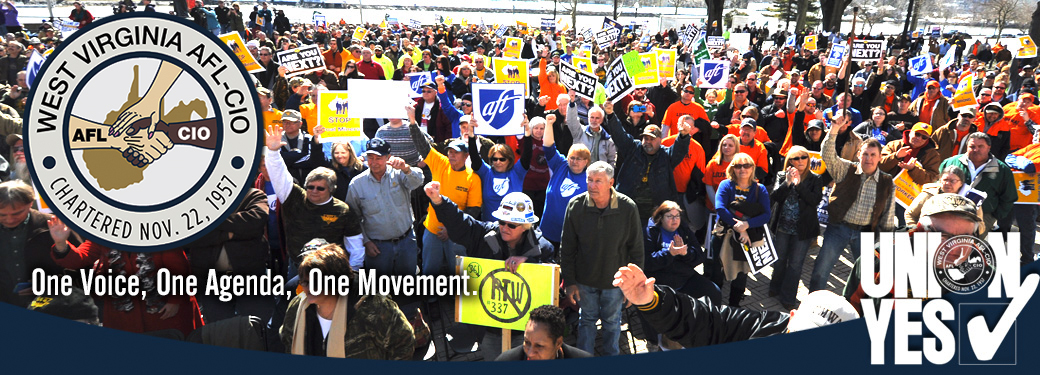Recent Press
- A Statement on the Passing of Former Delegate Doug Skaff
- Press Conference Wednesday Regarding Broadband Expansion Kickoff
- Ceremony Monday to honor WV workers who died on the job
- Press Conference Thursday on WV Federal Employee Job Cuts
- Rally in Support of IAM Local 598 Dow employees
- Join a Labor Day Celebration!
- COCA COLA: NOT TOO REFRESHING TO THEIR BECKLEY BRANCH EMPLOYEES
- WV AFL-CIO Mourns the Passing of Former Delegate Ron Fragale
- Teamsters Overwhelmingly Reject Contract
- Letter Carriers annual Stamp Out Hunger food drive Saturday
- Letter Carriers annual Stamp Out Hunger food drive Saturday
- Ceremony Sunday to honor WV workers who died on the job
- Statement from WV AFL-CIO President Josh Sword regarding Senate Bill 841
- A statement regarding Senate Bill 841 to cut unemployment benefits
- Cutting Earned Unemployment Benefits is Wrong
- WV AFL-CIO devastated at sudden passing of former President Kenneth Perdue
- A statement from West Virginia AFL-CIO President Josh Sword regarding Senator Joe Manchin’s decision to not seek re-election to the U.S. Senate
- Join a Labor Day Celebration!
- Ceremony Friday to honor WV workers who died on the job
- Teamster Members Unanimously Authorize Strike At Coke
- The PEIA Cost Shifting Bill (aka SB 268)
- Public Employee Representatives to Discuss Sweeping PEIA Legislation
- Union leaders’ statement on Senate PEIA bill
- Workers Will Rally for Fair Treatment at Italian Opera-Themed Tecnocap Celebration
- A celebration of former WV AFL-CIO President Jim Bowen's life Sunday
- Details
The following is a statement from West Virginia AFL-CIO President Kenny Perdue regarding the passage today of Senate Bill 1, “Right to Work,” and House Bill 4005, repeal of Prevailing Wage:
“The legislative leadership relentlessly pursued “Right to Work” and repeal of Prevailing Wage despite appeals from thousands of hard-working West Virginians and hundreds of employers and contractors to stop and consider the damage caused to workers in other states through lower wages and less safe workplaces, and despite proof that these measures do nothing to create jobs.
“On behalf of 140,000 hard-working men and women represented by the West Virginia AFL-CIO, I would again like to thank Governor Tomblin for seeing through the false promises offered by supporters of both bills and standing up for West Virginia’s middle class. In the coming months, we will direct our energy and resources toward reminding West Virginia working families which legislators failed them, and urging them to vote accordingly – to remember in November.”
- Details
West Virginia AFL-CIO President Kenny Perdue said he is extremely grateful to Governor Earl Ray Tomblin for vetoing both Senate Bill 1, commonly known as “Right to Work,” and House Bill 4005, repeal of state Prevailing Wage.
“On behalf of 140,000 hard-working men and women represented by the West Virginia AFL-CIO, I would like to thank Governor Tomblin for seeing through the false promises offered by supporters of both these bills,” Perdue said. “Rather than endorsing legislation that only serves out-of-state corporate interests, the Governor stood up for West Virginia working families.”
- Details
Members of the West Virginia Coalition of Retired Public Employees (CORPE) will gather at the state Capitol Thursday, February 11, to remind legislators of the benefits owed to the thousands of retired public employees who are struggling to get by.
“It has been years since our retirees have been provided with a cost-of-living increase on their pensions, yet the state taxes the Social Security benefits and pensions of our retired teachers and public employees,” noted CORPE spokesman Ernest “Spud” Terry. “On top of that, retirees face the possibility of skyrocketing state insurance premiums that they simply cannot afford.”
- Details
Polling conducted in the last several days by nationally recognized firm Public Policy Polling clearly shows that most West Virginians hold unions in very high regard and do not want lawmakers to pass legislation that would weaken them.
“Time and again, we’ve provided the facts that show ‘Right to Work’ lowers wages, leads to more workplace deaths, does nothing to attract quality jobs and inserts government in private employer/employee negotiation -- and the underlying reason for those outcomes is ‘Right to Work’ weakens unions,” West Virginia AFL-CIO President Kenny Perdue said. “That’s the sole purpose behind the legislation. And that’s why these big companies, the Chamber of Commerce, and these wealthy out-of-state interests want it.”
- Details
As West Virginia continues to recover from the far-reaching effects of Winter Storm Jonas, the West Virginia AFL-CIO sends out heartfelt thanks to the thousands of state Department of Highways and local government employees, first responders and utility workers who have dedicated so much time and energy to assisting state residents.
“Thousands of dedicated people -- working for the Department of Highways; state, county and local law enforcement; city and county governments; and utility companies -- have truly been put to the test,” West Virginia AFL-CIO President Kenny Perdue said. “They’ve put in long shifts under very difficult circumstances, and we are extremely grateful for a job well done.”
